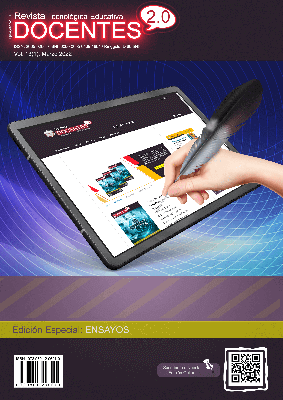Implementation of Hybrid Teaching as a Derivation of COVID-19
 DOI:
https://doi.org/10.37843/rted.v13i1.305
DOI:
https://doi.org/10.37843/rted.v13i1.305
Main Article Content
Abstract
Although digital technologies have tried to be installed in teaching practices for some years, the pandemic has had a strong impact worldwide on an educational system that was not prepared to assume such a sudden change. The present documentary research is supported by the Humanist paradigm, qualitative approach, narrative-interpretive type, and biographical design to know the recent experiences in which the hybrid model has been used and its possibilities of implementation in high education in Argentina. Due to COVID-19, new proposals for virtual or remote teaching have had to be considered in contexts of uncertainty and permanent change, which has challenged teachers and the educational system in general regarding scheduling a class. The use of technological tools, the optimization of communication channels, and the implementation of new strategies and work dynamics. In the course of these changes, the term “hybrid” began to be used to refer to teaching contexts that alternate face-to-face and virtual teaching. Although it is not a new approach, it is necessary to explore the complexity of its implementation in the current educational context, mainly concerning higher education, and determine the digital skills that teachers must develop. The results showed that universities try to include technology in the classroom, but there is still a long way. The main conclusions reached are teacher training and a shift towards a more student-centered paradigm.
Downloads
Metrics
Article Details

This work is licensed under a Creative Commons Attribution-NonCommercial-NoDerivatives 4.0 International License.
Those authors who have publications in our journal accept the following terms:
- When a work is accepted for publication, the author retains rights of reproduction, distribution of his/her article for exploitation in all countries of the world in the format provided by our magazine and any other magnetic medium, optical, and digital.
- Authors will retain their copyright and guarantee the journal the right first to publish their work, which will be simultaneously subject to the Creative Commons Acknowledgment License (Attribution-NonCommercial-NoDerivatives 4.0 International (CC BY-NC-ND 4.0)). That allows third parties to copy and redistribute the material in any medium or format, under the following conditions: Acknowledgment - You must properly acknowledge authorship, provide a link to the license, and indicate if any changes have been made. You may do so in any reasonable way, but not in a way that suggests you have the licensor's endorsement or receive it for your use. NonCommercial - You may not use the material for a commercial purpose. NoDerivatives - If you remix, transform, or build from the material, you cannot broadcast the modified material. There are no additional restrictions - You cannot apply legal terms or technological measures that legally restrict you from doing what the license allows.
- Authors may adopt other non-exclusive license agreements to distribute the published version of the work (e.g., deposit it in an institutional archive or publish it in a monographic volume) provided that the initial publication in this journal is indicated.
- Authors are allowed and recommended to disseminate their work through the Internet (e.g., in institutional telematic archives, repositories, libraries, or their website), producing exciting exchanges and increasing the published work's citations.
- Request of withdrawal an article has to be done in writing by the author to the Editor, becoming effective after a written response from the Editor. For this purpose, the author or authors will send correspondence via e-mail: [email protected].
- The author will not receive financial compensation for the publication of his work.
- All Docentes 2.0 Journal publications are under the Open Journal System (OJS) platform at: https://ojs.docentes20.com/.
References
Andreoli, S. (2021). Documento 13: Modelos híbridos en escenarios educativos en transición. Serie “Enseñanza sin presencialidad: reflexiones y orientaciones pedagógicas”. UBA Académica. http://citep.rec.uba.ar/wp-content/uploads/2021/06/AcaDocs_D13_Modelos-h%C3%ADbridos-en-escenarios-educativos-en-transici%C3%B3n-Documentos-de-Google.pdf
Andreoli, S., Apel, J., Florio, M.P., Grynwald, D., Soletic, A. & Weber, V. (2018). CitepLab Conecta Ideas: Tecnologías emergentes y estrategias de enseñanza en la Universidad. https://docs.google.com/document/d/e/2PACX-1vQW4bBdeAFyxcaQ4JuhhxPunIDZgn6uXBFtXH3kNAJUTQrEQi5B3Bh7fa9wnM1e-RiuhQG6C97JzTUR/pub
Barragán De Anda, A.B., Ávila-González, C., Belmonte-Herrera, A.M., Camarena-Cadena, M.J. & Gómez-Valenzuela, R. (2021). Ambientes híbridos de aprendizaje en estudios de posgrado. Revista Iberoamericana de Tecnología en Educación y Educación en Tecnología, 28, 149-156. https://doi.org/10.24215/18509959.28.e18 DOI: https://doi.org/10.24215/18509959.28.e18
Carrión, J. (mayo 20, 2020). La estética de la pandemia. am de querétao. https://amqueretaro.com/opinion/2020/05/20/la-estetica-de-la-pandemia-jorge-carrion-2/
Figueredo-Díaz, O. E. (2021). Gestión Digital Universitaria: Una Propuesta Emergente en Tiempos de Pandemia. Revista Tecnológica-Educativa Docentes 2.0, 1(1), 95–107. https://doi.org/10.37843/rted.v1i1.259 DOI: https://doi.org/10.37843/rted.v1i1.259
Gimeno-Sacristán, J. (Comp.), Pérez-Gómez, A.I., Martínez-Rodríguez, J. B., Torres-Santomé, J. & Álvarez-Méndez, J.M. (2008). Educar por competencias, ¿qué hay de nuevo? Editorial Morata.
Jackson, P. (2002). Práctica de la enseñanza. Amorrortu.
La Voz de Rosario (2021). La Universidad Nacional de Rosario invierte en educación híbrida. https://lavozderosario.net.ar/la-universidad-nacional-de-rosario-invierte-en-educacion-hibrida/
Maggio, M. (2018). Reinventar la clase en la universidad. Paidós.
Maggio, M. (2020). Las prácticas de la enseñanza universitarias en la pandemia: de la conmoción a la mutación. Campus Virtuales, 9(2), 113-122. http://www.uajournals.com/campusvirtuales/journal/17/9.pdf
Sancho, J. (2015). Tenemos que cambiar las preguntas. Revista del Instituto de Investigaciones en Ciencias de la Educación, 37, 119-124. http://revistascientificas.filo.uba.ar/index.php/iice/article/view/3454/3188
Sousa-Santos, S., Peset González, M. J. y Muñoz Sepúlveda, J.A. (2021). La enseñanza híbrida mediante flipped classroom en la educación superior. Revista de Educación, 391, 123-147. https://redined.educacion.gob.es/xmlui/handle/11162/205203?show=full
Unesco (2020). COVID-19 response-hybrid learning. Hybrid learning as a key element in ensuring continued learning. https://en.unesco.org/sites/default/files/unesco-covid-19-response-toolkit-hybrid-learnin g.pdf
UNR (2021). La Universidad que viene será muy distinta a la que conocimos antes de la pandemia. Universidad Nacional de Rosario. https://unr.edu.ar/noticia/14592/la-universidad-que-viene-sera-muy-distinta-a-la-que-conocimos-antes-de-la-pandemia
Zamora-López, M.C. (2021). Las competencias docentes ante los modelos educativos de telesecundaria e híbrido. Revista Inspiración Educativa México, 8(3), 33-45. http://www.revistainspiracioneducativa.com/RIE-MX-OCTAVA-EDICI%C3%93N.pdf#page=33






